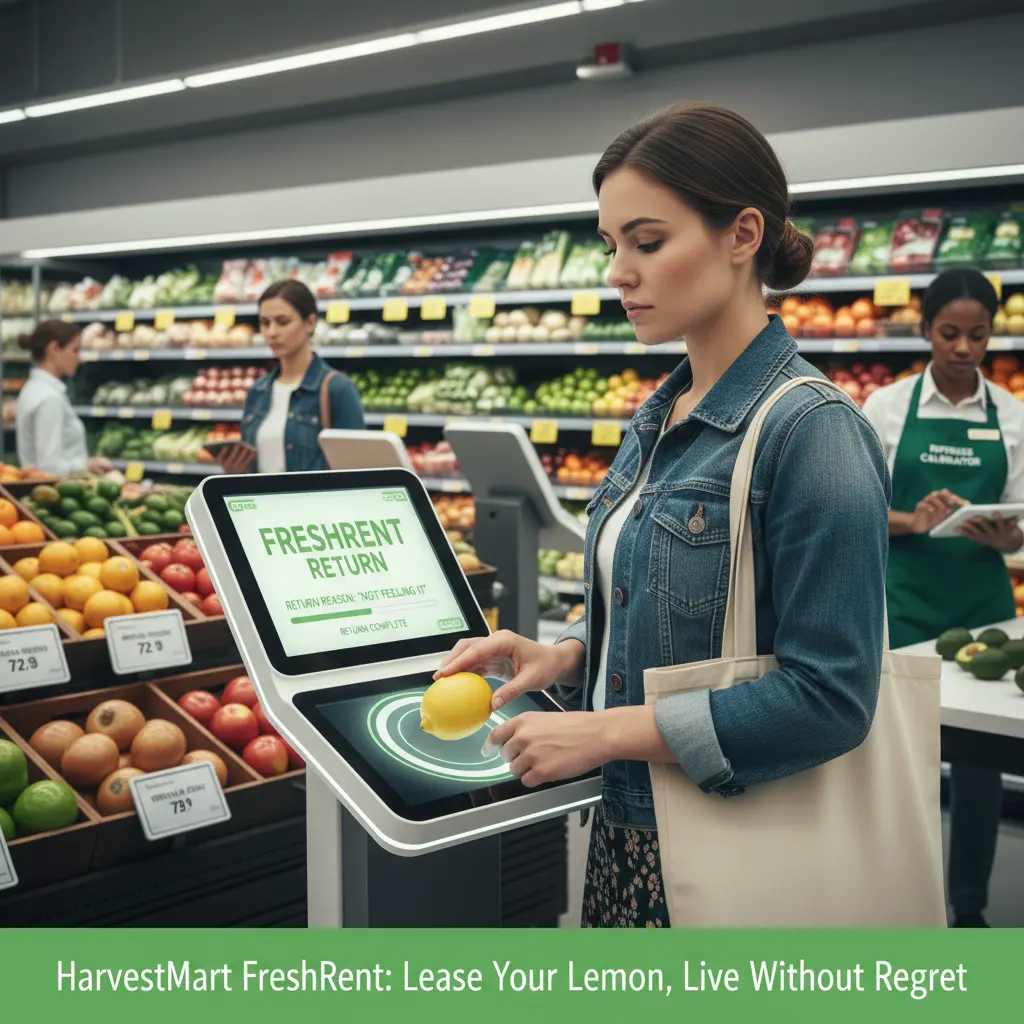NATIONWIDE — In an effort officials described as “meeting customers where their produce anxiety is,” national grocery chain HarvestMart on Tuesday launched a subscription service that lets shoppers rent fruits and vegetables on a weekly basis instead of purchasing them outright, company executives said.
Under the new HarvestMart FreshRent program, subscribers pay a monthly fee starting at $9.99 for Basic access to a rotating selection of seasonal produce they can borrow for up to 72 hours before returning to any HarvestMart location. Premium and Family tiers offer priority scheduling, custom ripeness levels, and a limited “swap” allowance for customers who decide at checkout they actually prefer denim-stiff kale to the soft, immediately usable kale they reserved online. All plans include the company’s proprietary Ripeness Forecast™ and an in-app Commitment Pause button that temporarily suspends all rental contracts when the user reports feeling “overcommitted.”
“We recognized that too many people are living in constant fear of choosing a pear that goes bad on a Tuesday,” said Marissa Gable, HarvestMart’s vice president of customer emotional supply. “FreshRent addresses the very real public-health problem of produce-related decision fatigue while simultaneously aligning inventory with actual consumption patterns.”
HarvestMart cited internal data indicating that 37.4 percent of shoppers reported throwing away at least one avocado per month, with 12.6 percent admitting to feeling “guilt and shame” afterward. An independent study released last year by the Institute for Domestic Decision-Making supported the chain’s analysis, finding that 63.2 percent of adults under 40 experienced moderate to severe “ripeness regret” after purchasing fresh fruit.
The program, which HarvestMart executives said had been piloted in 12 stores over six months, includes detailed product-management features: customers can specify ripeness on a seven-point scale, opt for “display-only” arrangements for decorative squash, or add Ripeness Insurance for 99 cents per item, allowing exchanges with no fee if the product reaches the undesired maturity stage while in the customer’s possession. The chain also unveiled a FreshRent courier service for $4.99, promising next-day delivery and a humidity-controlled tote to “protect both the produce and the subscriber’s sense of control.”
Local reaction has been mixed. “It’s so smart,” said Lindsey Marino, a 29-year-old freelance copywriter and early subscriber, while returning a lemon she’d decided she wasn’t feeling. “Now I can try basil with no long-term commitment. I’ve never been happier to have my culinary indecision validated by corporate America.” Across town, retiree Thomas Grier described his skepticism at a store kiosk. “I like to own my oranges,” he said. “If I start renting them, what comes next? Renting my lawn? Renting my memories?”
HarvestMart forecasts that FreshRent will reduce overall food waste by 5.2 percent within the first year while growing subscription revenue by an estimated 19.3 percent. “Data shows that rental customers tend to rotate items faster and use items more intentionally,” said Dr. Nikhil Patel, chief data scientist at HarvestMart, citing an algorithm that flags “hesitancy patterns” for managerial intervention. The company has hired a team of “ripeness calibrators” to train staff in matching customer-reported feeling states to produce firmness.
Consumer advocates urged caution, noting that rental models can obscure long-term cost and encourage repeated transactions. “There’s a risk this normalizes transactional relationships with everyday goods,” said Marla Kenyon of the Consumer Ownership Project. “People could wind up spending more to avoid a small amount of clutter.”
HarvestMart officials said they are already exploring expansions, including seasonal flower rentals and a corporate plan for office fruit stands. A company spokesperson declined to give a firm timeline but confirmed that the eventual FreshRent Plus would allow subscribers to “lease a mango for an entire day of decisive fruit-eating” and that members would be required to sign a 12-month ripeness waiver acknowledging they understand “fruits can surprise you.”

